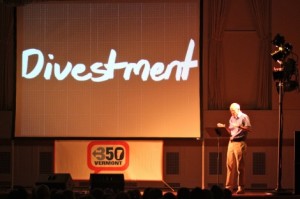Who thought the movement to divest from fossil fuels could have any real impact?
But it is – $2.6 trillion has been pledged to be pulled from portfolios since the movement began just three years ago!
436 institutions and 2040 individuals from 43 countries have pledged to divest, according to Arabella Advisors’ analysis. Pledges come from pension funds, health, education, philanthropy, faith, entertainment, climate justice and municipalities.
Once viewed as a strong, stable investment, the tides are turning. Not only are fossil fuel investments viewed as fueling climate change, but the stocks are starting to be seen for what they are – long-term losers. There’s a long way to go of course, with a total of $74 trillion invested worldwide.
On the other hand, fossil-fuel-free portfolios are doing just fine, and much of the money pulled is being invested in clean energy. Green mutual funds, for example, outperformed conventional funds by over 14% from 2012-2014, according to researchers at University of Edinburgh Business School.
"Our research shows these environmentally-friendly investments – which were once the preserve of ethical stockholders – are now delivering better returns than their peers, and attracting interest from a much wider community of investors," says research lead Gbenga Ibikunle.
Read our article, Fossil-Free Portfolios Outperform Those With Coal, Gas, Oil.
350.org started the divestment campaign:
California Legislation Forces Divestment
This summer, California passed legislation that requires the state’s two biggest pension funds to divest from coal.
SB 185 – "Investing with Values and Responsibility" – mandates divestment be completed within 18 months for the California Public Employees’ Retirement System (CalPERS) and California State Teachers’ Retirement System (CalSTRS).
"Coal is the fuel of the past and it’s no longer a wise investment for our pensioners," says Assemblyman Rob Bonta, who introduced the bill. "California’s utilities are phasing out coal, and it’s time our pension funds did the same," says Kevin de León, Senate President.
Where California goes, other states follow, and New York and Massachusetts are among six states that have similar bills in motion.
Indeed, the Massachusetts Pension Reserves Investment Trust fund lost $500 million – 28% of its value – during the past year because of fossil fuel investments, according to Trillium Group.
Other notable commitments to divest include University of California system, Stanford University, University of Oxford, Norway’s Pension Fund, British and Canadian Medical Associations, World Council of Churches, US Episcopal Church and Rockefeller Brothers Fund. Some are divesting from all fossil fuel companies, others are starting with coal and/or tar sands companies.
In fact, for the first time financial analysts concur that fossil fuel investments have become a significant risk to portfolios: HSBC, Citigroup, Mercer, Bank of England and the International Energy Agency have all come out with reports to this effect.
Finally, Green Investing Taking Hold?
It’s been about 20 years since green mutual funds, ETFs and portfolio advisors sprang up in an attempt to move peoples’ portfolios to support the green economy.
Some of the largest companies started green investment units, but that’s always been a tiny fraction of their operations. Over the summer, however, Goldman Sachs appointed a partner and managing director as its global head of environmental, social and governance (ESG) investing, and acquired Imprint Capital, a specialist firm in the field. Morgan Stanley and Bank of America/Merrill Lynch are following suit.
Morningstar recently announced it would begin displaying ESG scores for mutual funds and exchange-traded funds.
Check out Fossil Free Funds, where you can see fossil fuel holdings in the 1500 most widely-held mutual funds. A ranking system identifies funds without fossil fuels.
Read Arabella Advisors’ report, Measuring the Growth of the Global Fossil Fuel Divestment and Clean Energy Investment Movement.
Learn more about divesting and the movement:

